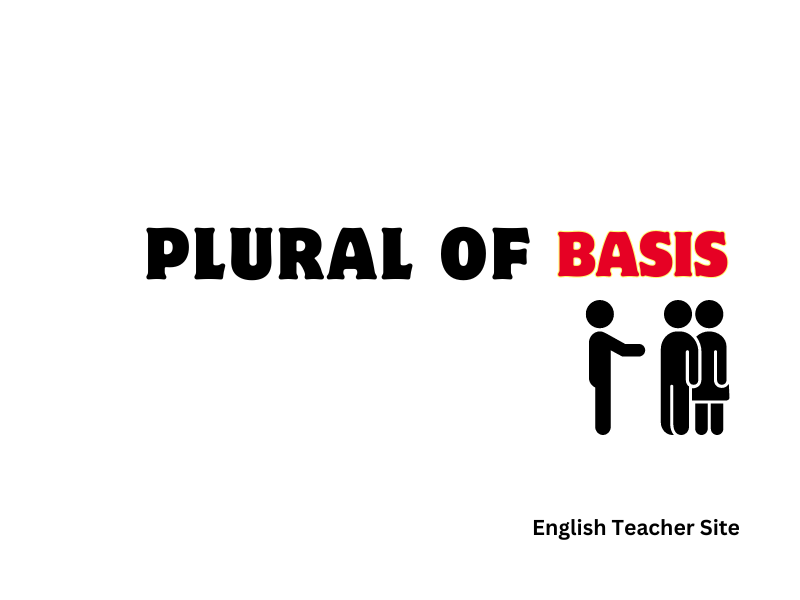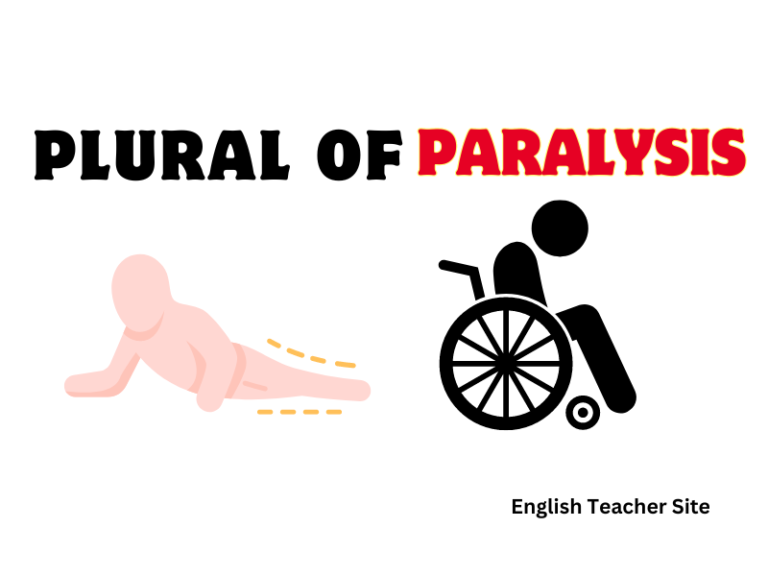Whats the Plural of Basis: Understanding Grammatical Number

- “Basis” becomes “bases” in the plural form, following a regular pattern in English.
- The plural “bases” is integral in many fields as it represents foundational elements.
- Understanding “basis” and “bases” aids in mastering the irregularities of English noun pluralization.
The word “basis” is one such noun that often causes perplexity among those trying to grasp the conventions of English spelling and grammar. As with many English words that end in “-is,” “basis” does not follow the simple rule of adding an “s” to form its plural.
Instead, the term “bases” is the correct plural form of “basis,” pronounced BAY-seez. This transformation from “basis” to “bases” aligns with the pattern observed in other nouns with similar endings, where “-is” becomes “-es.”
What’s the Plural of Basis?
The plural of “basis” is “bases,” pronounced as /ˈbeɪ.siz/. This pattern holds true for several other nouns that end in “is.” Understanding this rule is important for using these nouns correctly in both writing and speech.
Example Words and Their Plurals:
| Singular | Plural |
|---|---|
| Basis | Bases |
| Thesis | Theses |
| Crisis | Crises |
| Analysis | Analyses |
Common Usage:
- The scientists discussed various bases for their hypothesis.
- The instructor provided a comprehensive review of multiple theses during the lecture.
- In times of multiple crises, it is essential to remain calm.
- The report included several analyses of the data.
It is essential to remember that the plural “bases” differs from the plural form of “base,” which refers to something that serves as a foundation or starting point and becomes “bases” as well.
Common Mistakes:
- Basis’s: Incorrect possessive form used as plural.
- Basi: An attempt at pluralization that is incorrect.
- Basis: Simply using the singular form and intending it to be plural.
Is Basis Singular or Plural?
The word “basis” is a noun that is singular. Its plural form, following a common pattern in English for words ending with “-is”, becomes “bases”. Pronunciation differs when spoken aloud; “basis” is pronounced as /ˈbeɪ.sɪs/, whereas “bases” is pronounced as /ˈbeɪ.siːz/.
Here are tables to illustrate the usage of both singular and plural forms:
Table 1: Using ‘Basis’ in a Sentence
| Singular Form | Example |
|---|---|
| Basis | The study was conducted on the basis of previous findings. |
Table 2: Using ‘Bases’ in a Sentence
| Plural Form | Example |
|---|---|
| Bases | There are several bases for the argument presented in the article. |
To decide whether to use the singular or plural form, consider what you are referring to:
- Use “basis” when referring to one foundation or starting point.
- Use “bases” when there are multiple foundations or points of reference.
- “Basis”: singular noun (e.g., The hypothesis has one clear basis.)
- “Bases”: plural noun (e.g., The debate had many bases, all of which were explored.)
What’s the Definition of Basis/Bases?
The term basis refers to the foundational element or starting point from which something develops. It’s a concept critical for understanding structures or arguments across various disciplines. Basis is a singular noun and has its roots in Greek, where it means “a base to stand on.”
What’s the Plural of Basis?
| Singular | Plural |
|---|---|
| Basis | Bases |
Consider the examples below to understand the usage of “bases” in sentences:
- The scientists formulated their hypothesis on multiple bases.
- There are several bases for the argument presented by the lawyer.
The plural form is used in various contexts, from mathematics and science to grammar and law. It indicates more than one foundation or underlying principle.
| Context | Example Sentence |
|---|---|
| Scientific Theory | The experiment has several bases. |
| Grammatical Rules | Our language has many bases for its rules. |
| Legal Argumentation | The case has multiple bases for appeal. |
In summary, the key points to remember are:
- The transformation of basis to plural form is by changing “-is” to “-es.”
- Pronounce bases as “BAY-seez.”
- Different from “base” (singular) which becomes “bases” in baseball, but pronounced “BAY-siz.”
Irregular Nouns that End in -sis/-ses
| Singular Form | Plural Form |
|---|---|
| basis | bases |
| thesis | theses |
| crisis | crises |
| analysis | analyses |
These irregular plural forms are important to master because they are commonly used in academic, scientific, and professional contexts.
Nouns that end in -sis change to -ses by:
- Removing the -is
- Adding -es
Emphasis should be on the change from “is” to “es” for proper conversion into the plural form. It should be noted that not all words resembling this pattern follow the rule; English contains exceptions due to its borrowing from other languages.
Examples of nouns following this pattern include:
- diagnosis: diagnoses
- prognosis: prognoses
- synopsis: synopses
- hypothesis: hypotheses
Examples of Basis Used in Context
In the following tables, observe the contrast between the singular and plural usage of “basis”:
Table 1: Singular Use of Basis
| Sentence | Explanation |
|---|---|
| The basis of her argument is solid. | “Basis” is singular, indicating one foundation for the argument. |
| Every good plan has a strong basis. | Again, “basis” refers to one underlying principle or foundation. |
Table 2: Plural Use of Bases
| Sentence | Explanation |
|---|---|
| The different bases for the theory were all explored. | “Bases” is plural, implying there are multiple foundations or principles. |
| Our decision should cover all bases to ensure no aspect is overlooked. | “Bases” denotes several key points or elements to consider. |
- Singular: “The basis of this research is the most recent data available.”
- Plural: “The research has various bases, including qualitative and quantitative data.”
Examples of the Word Bases in Context
| Singular Form: Basis | Plural Form: Bases |
|---|---|
| The basis of the argument | The bases of the arguments |
| On a temporary basis | On temporary bases |
Examples in Sentences:
- Researchers must establish a single basis for comparison before drawing conclusions from their data.
- In their respective fields, the scientists discussed the various bases for their theories and methodologies.
Usage Notes:
- A financial basis pertains to the underlying support for an economic theory or business project.
- When talking about philosophical bases, one refers to the foundational principles upon which philosophical arguments are built.
| Context | Correct Usage |
|---|---|
| Mathematics | Different bases are used for numeral systems beyond the decimal basis. |
| Biology | The genetic bases for traits are studied to understand inheritance. |
Synonyms of Basis
In an academic environment, one might encounter phrases that necessitate a synonymous term for “basis” to enrich the language used:
- Grounds: Often utilized when justifying opinions or actions.
- Foundation: Typically refers to the starting point or basis of a structure or idea.
- Cornerstone: Implies a fundamental element or starting point, similar to a strong foundation.
Below are tables highlighting synonyms of “basis” in two separate applications: abstract and material contexts.
Abstract Application
| Term | Usage |
|---|---|
| Grounds | They had solid grounds for their decision. |
| Foundation | Moral principles are the foundation of her philosophy. |
| Cornerstone | Trust is the cornerstone of their relationship. |
Material Application
| Term | Usage |
|---|---|
| Bedrock | Respect is the bedrock of effective team management. |
| Footing | The footing for the argument was not strong enough. |
| Support System | The policy served as a support system for economic growth. |
In list format, additional synonyms include:
- Premise: Suggests an initial statement from which further reasoning is developed.
- Underpinning: Provides the structural basis or core support for an idea.
- Base: Can indicate the lowest part or essential component from which something extends.
Origin of the Word Basis
The term basis is derived from the Greek “basis,” meaning a step or standing. It entered the English lexicon through Latin, where it held the same meaning. The transformation of words from ancient languages to Modern English often involves phonetic and grammatical adjustments that conform to current language standards.
| Language | Word | Meaning |
|---|---|---|
| Greek | βάσις | Step |
| Latin | basis | Foundation |
In Greek, bainein translates to “to go” or “to walk,” which is a root of the noun basis, alluding to the idea of a position from which movement or action originates. Ancient Greek and Latin scholars would have understood basis as the figurative and literal ground upon which other structures or ideas are built.
- Etymology: Examining the transformation from Greek to Latin provides context to the modern spelling and usage.
- Adoption into English: The word maintained its morphological structure during its adoption into English, signifying stability and foundation.
The journey of the word basis illuminates the process by which the English language evolves and assimilates terms from other languages. The English usage has retained much of its original connotations, often referring to the underlying support or principle for something.
| Era | Usage |
|---|---|
| Ancient | Literal standing place |
| Modern | Figurative foundation |
The understanding and application of basis in English remains close to its etymological roots, emphasizing the direct lineage and the minimal change in meaning over centuries.
Sources
My name is Khamis Maiouf. I am the creator of the English Teacher Site, dedicated to providing valuable resources and insights for students around the world. With a passion for education and a commitment to helping students enhance their skills, I aim to make English teaching more effective and enjoyable for both educators and students.






